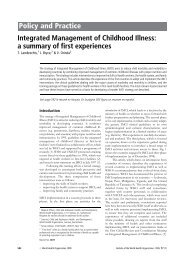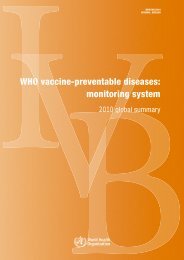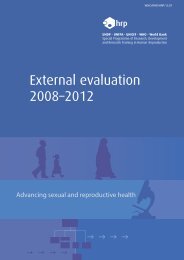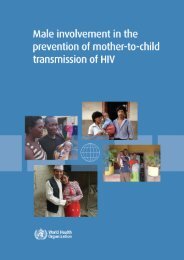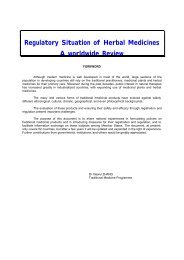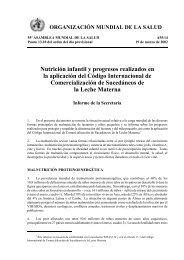IPDE - Extranet Systems - World Health Organization
IPDE - Extranet Systems - World Health Organization
IPDE - Extranet Systems - World Health Organization
Create successful ePaper yourself
Turn your PDF publications into a flip-book with our unique Google optimized e-Paper software.
119 Limitations of the <strong>IPDE</strong><br />
are frantically seeking help, or who are dissatisfied with their treatment<br />
or the amount of attention they are receiving. It may also be a reflection<br />
of certain personality traits. Although subjects may also feign waits or<br />
behaviour, particularly in compensation cases and some forensic and<br />
military situations, the <strong>IPDE</strong> discourages this by requiring documentation<br />
with convincing examples, anecdotes, and descriptions.<br />
Patients in a dysphoric state may have a selective recall or distorted<br />
perception of some of their behaviour. They may also confuse normal<br />
and abnormal personality traits with the symptoms of a mental disorder.<br />
There is evidence' that the PDE was resistant to changes in the symp<br />
toms of anxiety and depression that occurred during the course of treatment,<br />
when those symptoms were of mild to moderate severity. This is<br />
not to imply that some clinical states, particularly those accompanied by<br />
severe symptoms, do not invalidate the assessment of personality.<br />
Additional research is required on this important subject. When possible,<br />
some investigators may wish to postpone the assessment until the symptoms<br />
of other mental disorders have remitted.<br />
In ordinary clinical practice, a family member or close friend is often<br />
used as an additional source of information to offset the limitations of the<br />
self-repon method. We have experimented with various procedures for<br />
augmenting the subject's responses on the <strong>IPDE</strong> with data from other<br />
sources. Failure to acknowledge a behaviour, particularly one that is<br />
especially frowned upon by others, is sometimes followed on the <strong>IPDE</strong><br />
by such inquiries as, 'Have people told you that you're like that?'<br />
Affirmative replies are then pursued with the question, "Why do you<br />
think they've said that?" This approach can only be used selectively. If it<br />
were adopted in all situations where a behaviour has been denied, it<br />
would undermine the rapport between subject and examiner.<br />
We have also hied a parallel form of the interview in which an informant<br />
was asked viltually the same questions about the patient. There<br />
were often discrepancies, and it was not always obvious who had provided<br />
the more valid information. It proved difficult to formulate a set of<br />
practical guidelines that stipulate the source that should be used in scaring<br />
a particular criterion. The problem is a complicated one, and a satisfactory<br />
resolution awaits the availability of more empirical dam on the<br />
subject. Future studies may help identify those criteria that tend to pmduce<br />
discrepancies, and the characteristics of suhjects and informants<br />
that might be used to determine the preferred source of information.<br />
Meanwhile, we have adopted a practical, provisional solution to the<br />
informant pmblem. The <strong>IPDE</strong> has a second scoring column for informant









